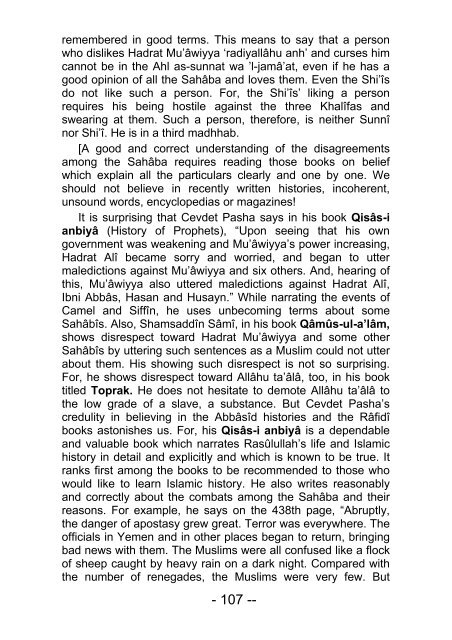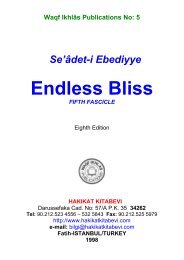3-Endless Bliss Third Fascicle - Hakikat Kitabevi
3-Endless Bliss Third Fascicle - Hakikat Kitabevi
3-Endless Bliss Third Fascicle - Hakikat Kitabevi
Create successful ePaper yourself
Turn your PDF publications into a flip-book with our unique Google optimized e-Paper software.
emembered in good terms. This means to say that a person<br />
who dislikes Hadrat Mu’âwiyya ‘radiyallâhu anh’ and curses him<br />
cannot be in the Ahl as-sunnat wa ’l-jamâ’at, even if he has a<br />
good opinion of all the Sahâba and loves them. Even the Shi’îs<br />
do not like such a person. For, the Shi’îs’ liking a person<br />
requires his being hostile against the three Khalîfas and<br />
swearing at them. Such a person, therefore, is neither Sunnî<br />
nor Shi’î. He is in a third madhhab.<br />
[A good and correct understanding of the disagreements<br />
among the Sahâba requires reading those books on belief<br />
which explain all the particulars clearly and one by one. We<br />
should not believe in recently written histories, incoherent,<br />
unsound words, encyclopedias or magazines!<br />
It is surprising that Cevdet Pasha says in his book Qisâs-i<br />
anbiyâ (History of Prophets), “Upon seeing that his own<br />
government was weakening and Mu’âwiyya’s power increasing,<br />
Hadrat Alî became sorry and worried, and began to utter<br />
maledictions against Mu’âwiyya and six others. And, hearing of<br />
this, Mu’âwiyya also uttered maledictions against Hadrat Alî,<br />
Ibni Abbâs, Hasan and Husayn.” While narrating the events of<br />
Camel and Siffîn, he uses unbecoming terms about some<br />
Sahâbîs. Also, Shamsaddîn Sâmî, in his book Qâmûs-ul-a’lâm,<br />
shows disrespect toward Hadrat Mu’âwiyya and some other<br />
Sahâbîs by uttering such sentences as a Muslim could not utter<br />
about them. His showing such disrespect is not so surprising.<br />
For, he shows disrespect toward Allâhu ta’âlâ, too, in his book<br />
titled Toprak. He does not hesitate to demote Allâhu ta’âlâ to<br />
the low grade of a slave, a substance. But Cevdet Pasha’s<br />
credulity in believing in the Abbâsîd histories and the Râfidî<br />
books astonishes us. For, his Qisâs-i anbiyâ is a dependable<br />
and valuable book which narrates Rasûlullah’s life and Islamic<br />
history in detail and explicitly and which is known to be true. It<br />
ranks first among the books to be recommended to those who<br />
would like to learn Islamic history. He also writes reasonably<br />
and correctly about the combats among the Sahâba and their<br />
reasons. For example, he says on the 438th page, “Abruptly,<br />
the danger of apostasy grew great. Terror was everywhere. The<br />
officials in Yemen and in other places began to return, bringing<br />
bad news with them. The Muslims were all confused like a flock<br />
of sheep caught by heavy rain on a dark night. Compared with<br />
the number of renegades, the Muslims were very few. But<br />
- 107 -











